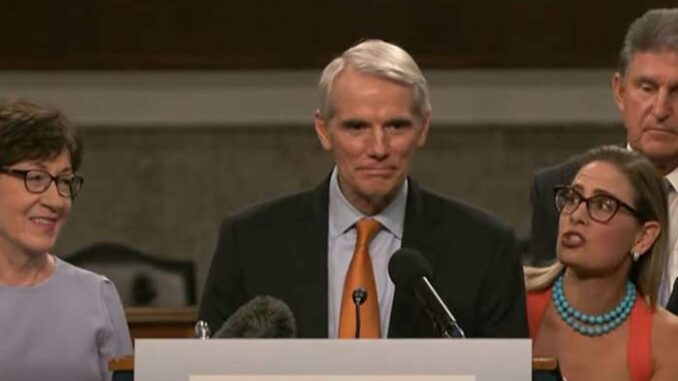
WASHINGTON – Arizona’s Sen. Kyrsten Sinema is being credited with pushing a bipartisan infrastructure spending package over the finish line this week.
Sinema was part of a group of Senators in both parties and President Biden to reach final agreement on legislative text to make what she says is the “strongest investment in America’s critical infrastructure in a century.”
“It’s rare to have an elected official from one party publicly praising another from the opposite party, but I’m doing just that because it’s so essential for the future of our nation that Sinema holds fast in keeping the filibuster intact,” Sinema colleague Sen. Thom Tillis wrote in an op-ed published on Wednesday. “If Democrats had eliminated the filibuster, there would have been no attempt to find common ground on infrastructure or other critical issues. It doesn’t necessarily make legislating easy, but it is getting members of both parties in the same room to work together for the good of the nation, as our Founding Fathers intended.”
“While bringing both parties together can seem impossible these days, Arizonans elected me to do the hard work. Our historic legislation would make the strongest investment in America’s critical infrastructure in a century—creating Arizona jobs, expanding economic opportunities for our state, securing our water future, and protecting our communities from wildfires,” said Sinema in a press release.
The newly announced Bipartisan Infrastructure Investment and Jobs Act would make major upgrades to roads, bridges, rail lines, water systems, power grids, broadband access, public transit, airports, and other critical infrastructure—all without raising taxes on everyday Americans, with $550 billion in new spending over the coming years. Investments include:
- Drinking Water and Wastewater Infrastructure Act, investing $23.4 billion for water resource projects that include aging infrastructure, new technologies, and water security for Arizona and tribal communities.
- $110 billion for roads, bridges, and major projects.
- $65 billion in broadband grants to expand broadband access, support broadband affordability, expands eligible private activity bond projects to include broadband infrastructure, and supports middle-mile deployment efforts.
- $11 billion in highway and pedestrian safety programs, including a significant investment in Safe Streets programs that prevent death and serious injury on roads and streets.
- $39.2 billion investment in the nation’s transit system repair backlog, which the U.S. Department of Transportation estimates is more than 24,000 buses, 5,000 rail cars, 200 stations, and thousands of miles of track, signals, and power systems.
- $17.3 billion in ports and water ways, including land ports of entry through the Army Corps, Department of Transportation, Coast Guard, General Services Administration, and Department of Homeland Security.
- $25 billion for airport improvement grant program for runway, gates, and taxiways, as well as a new Airport Terminal Improvement program for terminals, concessions, and multimodal connections, and improvements to Air Traffic Control Infrastructure.
- $47 billion investment in resiliency, which includes $340 million for 5 years (total of $1.7 billion) for Indian Health Services Sanitation Facilities Construction Enhancement that provide for the planning, design, construction, modernization, improvement, and renovation of water, sewer, and solid waste sanitation facilities that are funded in whole or part by the Indian Health Service.
- $7.5 billion for expanding Electric Vehicle (EV) charging infrastructure.
- $7.5 billion in EV and Low-Carbon school buses and ferries for the production and procurement of electric vehicles and low carbon school buses and ferries.
- $66 billion for passenger and freight rail, including funding for the Amtrak National Network, expanding intercity passenger rail to new routes, and making highway-rail crossings safer.
- Enhancement to Fixing America’s Surface Transportation law (known as FAST-41), which reformed federal infrastructure permitting process, allowing for efficient and timely completion of larger infrastructure projects.
- Energy Infrastructure Act, investing in the reliability and resilience of America’s electric grid and expand transmission capabilities, building domestic supply chains for clean energy technologies, and strengthening Western Water security.
- Long-term spending for capital assets that will improve economic efficiency, productivity, GDP and revenue, and will not increase inflation.
The legislation will proceed to debate on the Senate floor over the coming days.
